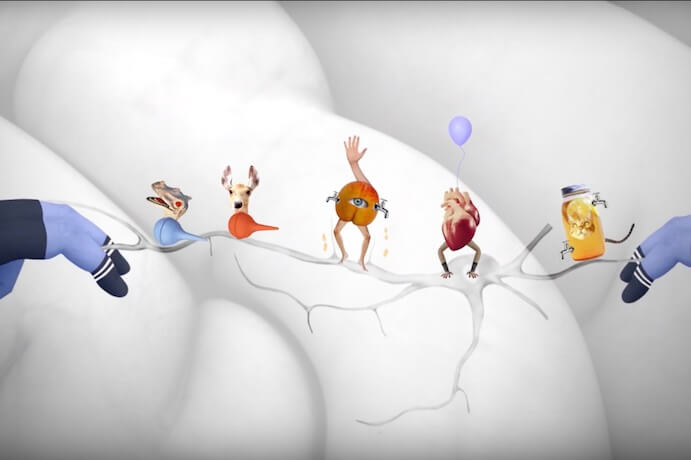Alarm Will Sound’s most recent video, “Winners,” is available on I Care If You Listen (.com). Directed by Polish artist Kasia Nalewajka with music by Scott Johnson and featuring the voice and ideas of noted philosopher Daniel Dennett, “Winners” is an wild, thought-provoking animated exploration of memes.

ABOUT KASIA NALEWAJKA
Kasia was born in Poland and studied Natural Sciences at the University of Warsaw. Combining her bizarre curiosity towards animals and an interest in illustration, she developed a passion for animated films. She mastered her puppet animation skills in the famous film studio Se-Ma-For (Lodz, Poland) where she later directed an award winning music video Sponge Ideas (co-directed by Paulina Szewczyk). After moving to the UK, she studied Directing Animation at the National Film and Television School. Her graduation film Pineapple Calamari was screened at festivals around the world and won multiple awards. Currently she’s working on her next animated short. She lives in London.
ABOUT SCOTT JOHNSON
Composer Scott Johnson has been a pioneering voice in the new relationship being forged between the classical tradition and the popular culture that surrounds it. An early advocate of using rock instruments and technology in scored composition, he has appeared as a virtuosic electric guitarist in many of his pieces. His early work introduced the idea of instrumental writing based on sampled speech, and later works continue to develop his musical gene-splicing, blending complex and intertwined chamber music with a rock band’s hall-filling wall of sound.
Underneath the music lies a basic insight: the evolution of classical composition has always been shaped by its environments, and living composers are remaining true to that legacy when they draw on the ever-changing ecosystem of our own popular musics. Speaking the languages of contemporary culture will help us create a picture of our times, as composers of the past did with theirs. Johnson’s music has been commissioned and performed internationally by ensembles such as the Kronos Quartet, the Bang On A Can All-Stars, and Alarm Will Sound, as well as his own groups. His three decades of effort have been recognized with numerous grants and awards, including a Koussevitsky commission, a 2006 Guggenheim Fellowship, and a 2015 American Academy of Arts and Letters Fellowship.
ABOUT Daniel Dennett
Daniel C. Dennett, the author of Breaking the Spell (Viking, 2006), Freedom Evolves (Viking Penguin, 2003) and Darwin’s Dangerous Idea (Simon & Schuster, 1995), is University Professor and Austin B. Fletcher Professor of Philosophy, and Co-Director of the Center for Cognitive Studies at Tufts University. He lives with his wife in North Andover, Massachusetts, and has a daughter, a son, and five grandchildren. He was born in Boston in 1942, the son of a historian by the same name, and received his B.A. in philosophy from Harvard in 1963. He then went to Oxford to work with Gilbert Ryle, under whose supervision he completed the D.Phil. in philosophy in 1965. He taught at U.C. Irvine from 1965 to 1971, when he moved to Tufts, where he has taught ever since, aside from periods visiting at Harvard, Pittsburgh, Oxford, the École Normale Supérieure in Paris, the London School of Economics and the American University of Beirut. He is currently a member of the external faculty of the Santa Fe Institute and New College of the Humanities in London.
His first book, Content and Consciousness, appeared in 1969, followed by Brainstorms (1978), Elbow Room (1984), The Intentional Stance (1987), Consciousness Explained (1991), Darwin’s Dangerous Idea (1995), Kinds of Minds (1996), and Brainchildren: A Collection of Essays 1984-1996 (MIT Press and Penguin, 1998). Sweet Dreams: Philosophical Obstacles to a Science of Consciousness, was published in 2005 by MIT Press. He co-edited The Mind’s I with Douglas Hofstadter in 1981. He is the author of over four hundred scholarly articles on various aspects on the mind, published in journals ranging from Artificial Intelligence and Behavioral and Brain Sciences to Poetics Today and The Journal of Aesthetics and Art Criticism. His most recent books are Intuition Pumps and Other Tools for Thinking (Norton, 2013), Caught in the Pulpit: Leaving Belief Behind, with Linda LaScola (Amazon.com, 2013), and From Bacteria to Bach and Back: The Evolution of Minds (Norton, 2017).
He gave the John Locke Lectures at Oxford in 1983, the Gavin David Young Lectures at Adelaide, Australia, in 1985, and the Tanner Lecture at Michigan in 1986, among many others. He has received two Guggenheim Fellowships, a Fulbright Fellowship, and a Fellowship at the Center for Advanced Studies in Behavioral Science. He was elected to the American Academy of Arts and Sciences in 1987.
He was the Co-founder (in 1985) and Co-director of the Curricular Software Studio at Tufts, and has helped to design museum exhibits on computers for the Smithsonian Institution, the Museum of Science in Boston, and the Computer Museum in Boston.
In 2014, after more than forty summers hobby farming in Maine, he sold his farm and bought a house on an island in Maine, where he can pursue less strenuous activities while continuing his research.

